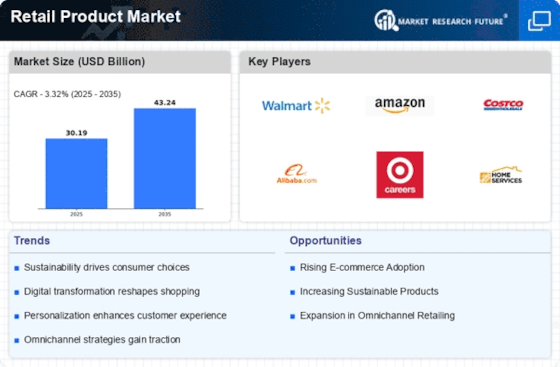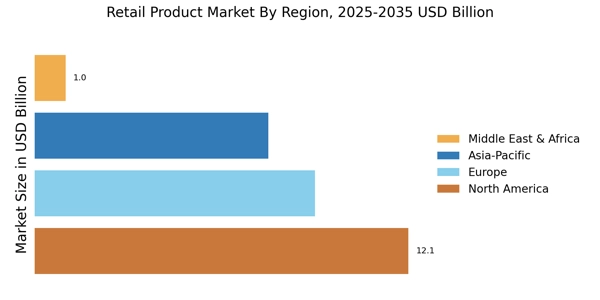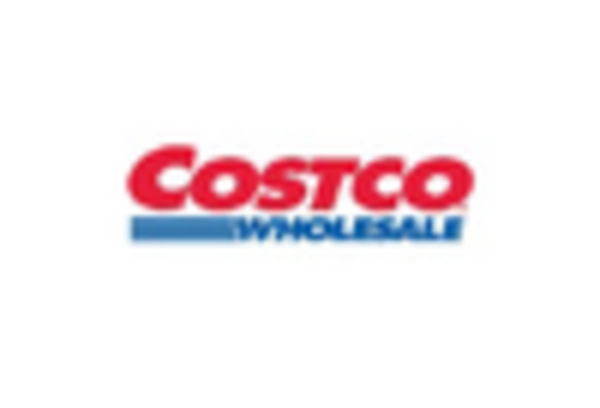E-commerce Growth
The Retail Product Market is witnessing a remarkable shift towards e-commerce, driven by changing consumer preferences and technological accessibility. Recent data indicates that e-commerce sales have surged, accounting for approximately 25% of total retail sales. This trend is propelled by the convenience of online shopping, coupled with the proliferation of mobile devices. Retailers are increasingly investing in their online platforms to enhance user experience and optimize logistics. The rise of social commerce, where social media platforms facilitate direct purchases, further exemplifies this shift. As consumers continue to embrace online shopping, the Retail Product Market must adapt to meet the evolving demands of a digital-savvy customer base.
Technological Advancements
The Retail Product Market is currently experiencing a surge in technological advancements that are reshaping consumer interactions and operational efficiencies. Innovations such as artificial intelligence, machine learning, and augmented reality are being integrated into retail strategies, enhancing customer experiences and streamlining supply chains. For instance, AI-driven analytics are enabling retailers to predict consumer behavior with greater accuracy, potentially increasing sales by up to 20%. Furthermore, the adoption of mobile payment systems and contactless transactions is facilitating smoother shopping experiences, which is crucial in a competitive landscape. As technology continues to evolve, retailers that leverage these advancements are likely to gain a significant edge in the Retail Product Market.
Global Supply Chain Optimization
The Retail Product Market is currently navigating challenges related to supply chain optimization, which has become increasingly critical in a competitive environment. Retailers are focusing on enhancing their supply chain efficiencies to reduce costs and improve product availability. Recent statistics reveal that optimizing supply chains can lead to a reduction in operational costs by up to 15%. This involves leveraging technology for better inventory management and logistics planning. Additionally, retailers are exploring local sourcing options to mitigate risks associated with global supply chain disruptions. As the Retail Product Market continues to evolve, those who successfully optimize their supply chains are likely to gain a competitive advantage.
Consumer Demand for Personalization
In the Retail Product Market, there is a growing consumer demand for personalized shopping experiences. Shoppers are increasingly seeking products and services tailored to their individual preferences, which has prompted retailers to adopt data-driven strategies. By utilizing customer data and analytics, retailers can create targeted marketing campaigns and personalized product recommendations. Research suggests that personalized experiences can lead to a 10 to 15% increase in customer loyalty and repeat purchases. This trend is particularly evident in sectors such as fashion and beauty, where consumers expect brands to understand their unique tastes. As personalization becomes a key differentiator, retailers must invest in technologies that enable them to deliver customized experiences in the Retail Product Market.
Sustainability and Ethical Practices
The Retail Product Market is increasingly influenced by consumer awareness regarding sustainability and ethical practices. Shoppers are becoming more conscious of the environmental and social impacts of their purchases, leading to a demand for sustainable products. Retailers are responding by implementing eco-friendly practices, such as reducing packaging waste and sourcing materials responsibly. Data indicates that nearly 70% of consumers are willing to pay more for sustainable products, highlighting the potential for growth in this segment. Additionally, transparency in supply chains is becoming a critical factor for consumers, as they seek assurance that their purchases align with their values. As sustainability continues to shape consumer behavior, retailers must adapt their strategies to thrive in the evolving Retail Product Market.

















